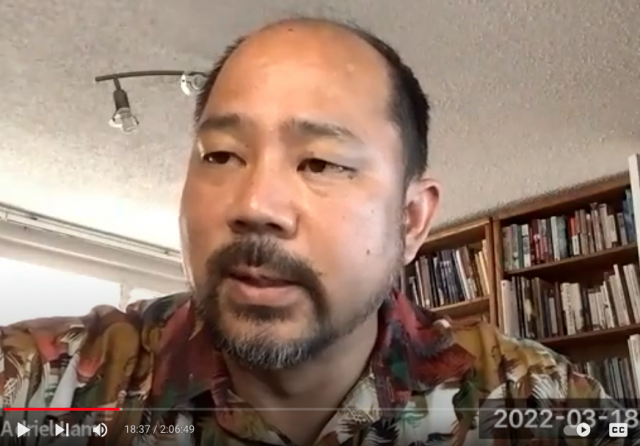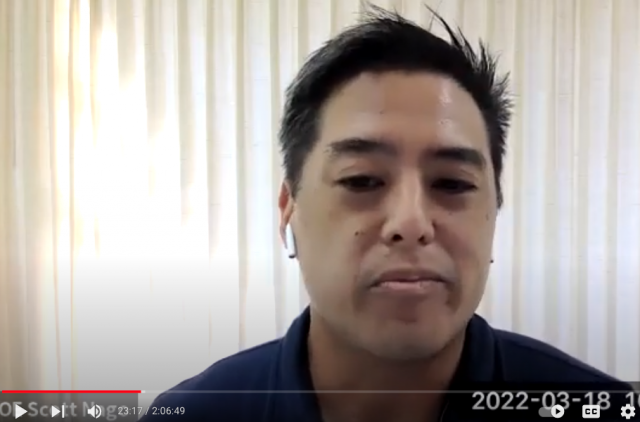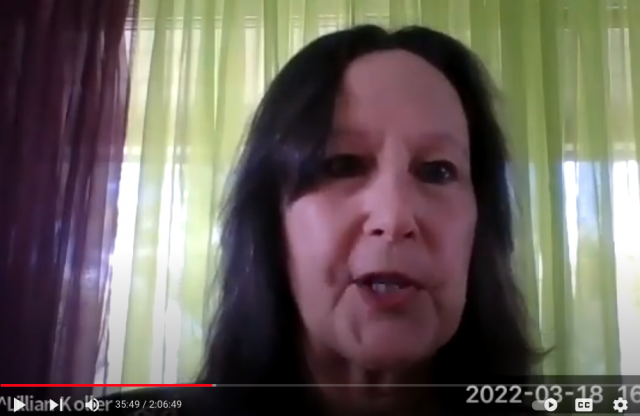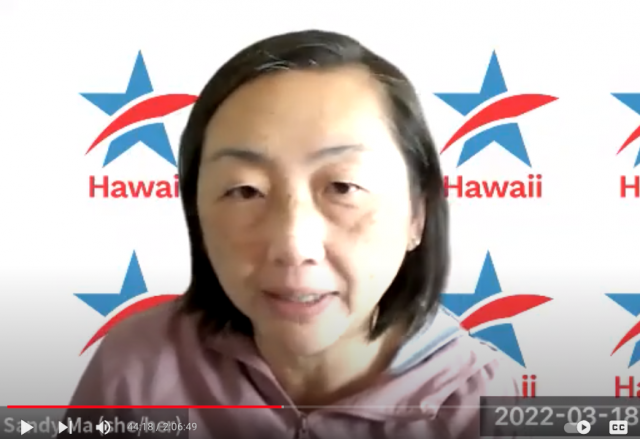Chad Blair: Hawaii Is The Latest State To Get Hit With Claims Of Election Fraud
Donald Trump and many of his supporters continue to argue that the 2020 presidential election was “stolen” from the former president, something that opponents and most media outlets dismiss as a “big lie.”


While even Trump’s own attorney general does not believe there was widespread fraud in the election — and the 6-3 GOP-leaning U.S. Supreme Court declined to take up Trump’s legal challenges — questions continue to be raised about the validity of the national vote, in particular in states where the margins between the loser Trump and the winner, Democrat Joe Biden, were fairly tight: Pennsylvania, Wisconsin, Georgia, Michigan, Wisconsin and Arizona.
No one has mentioned Hawaii up to this point, and it doesn’t seem likely that a state as blue as ours — Biden defeated Trump 63% to 34%, or 366,130 votes to 196,864 — will be contested.
But there is a challenge to the 2020 vote, and the Hawaii State Elections Commission is taking it seriously, including at a public meeting set for Friday. And it’s not about those long lines to vote outside Honolulu Hale and Kapolei Hale during the primary.
Adriel Lam, a Kaneohe resident, has asked the commission to investigate whether Hawaii’s voter registration records — described by Lam as “critical infrastructure” — might somehow be vulnerable.

It’s complicated, but at its core it boils down to whether the voter databases handled by the four counties and shared with the state are accurate — and, by extension, whether the final vote was accurate. In that, Lam’s complaint echoes election inquiries made by the Trump team and others, even as the 2022 election approaches.
“There are a lot of inconsistencies in the voter registration database,” Lam told me Tuesday, adding that he has not been satisfied with the answers that state and county officials have given him so far. “Many of my friends received extra ballots, their kids never got an update on their voter registration on the database end, deceased people received ballots.”
Does Lam think the Hawaii vote was marked by fraud?
“Fraud is for the attorney general to determine,” he replied. “But I think there are a lot of anomalies and inconsistencies that just do not conform with logic or even historical patterns and trends.”
Lam wants the 2020 vote audited, something that has also been called for by the GOP in other states, notably Arizona, where an audit actually resulted in more votes for Biden.

The multiple back-and-forth emails and letters that started in April 2021 over the Lam complaint make for mind-numbing reading. (It’s all posted on the elections website, so have at it.)
As recently as March 11, Scott Nago, the chief elections officer, told the committee in a Zoom meeting that he and his office met with representatives from the Hawaii Republican Party — including party chair Lynn Finnegan — on Jan. 27 to discuss voter registration and the conduct of the Elections Commission.
Nago explained that that meeting included an overview of the processes to register to vote and conduct “list maintenance,” an explanation of the roles of the state and the counties, and how fraud is reported.
“We further explained that absent any specifics, a review of voter fraud claims would be difficult to impossible to undertake,” Nago wrote in his status of operations report. “Since our meeting, we have reviewed the functionality of the statewide voter registration system to ensure it is working properly. For example, we are able to confirm the individual voter records match the compiled lists and reports.”
Nago’s response, however, raised concerns on the part of some commissioners at a March 18 commission meeting, specifically Lillian Koller.

“My question with respect to that is, what were you referring to, what type of voter fraud claims that you felt you didn’t have sufficient specifics such that it would be difficult to impossible to undertake?”
Koller, who was appointed to the commission by the Republican leader in the state Senate, said Lam had provided information in his complaint that she described as “very specific” including charts, dates and names.
Nago explained to Koller and other commissioners that his statement was based on a lack of specifics provided by Lam at the time, but that Lam subsequently did provide more information. Nago then responded to the commission in writing as well, on March 16, along with the four county clerks — Glen Takahashi on Oahu, John Henricks in Hawaii County, Kathy Kaohu in Maui County and Jade Fountain-Tanigawa in Kauai County.
The eight-page letter said that, while acknowledging that a new voter registration system had been put in place five years ago and had received ongoing maintenance, “Without more details, we cannot conclude that the number of updates is unreasonable or a sign of any issues with the integrity of the statewide voter registration system.”
Nago and the clerks closed by saying that they appreciated Lam’s review of the voter registration rolls, but also said this:
“Election integrity is not something we take lightly. We would be the first to acknowledge that the voter registration roll is fluid and imperfect. It is constantly changing, modified, and corrected. We can always improve our internal processes to review and audit the system. However, this is not indicative of a systemic problem or voter fraud. As election administrators, we have dedicated our time and effort to ensure the security, accuracy, and integrity of the elections.”
‘A Full Count’
I asked Lam about some of those “specific examples” of voter roll irregularities. He pointed to his contention that in the City and County of Honolulu, several hundred more ballots appear to have been cast than there were envelopes distributed to hold them. He also cited one Oahu precinct, 39.5 in the Kunia area, that has nine registered voters and yet 12 votes were cast.
“A full count of the envelopes and the ballots would provide an answer as to which of the State or County numbers are correct,” he stated in a Dec. 23 email to election officials.
It’s up to the commission to decide the merits of Lam’s complaint. But Sandy Ma, the executive director of Common Cause Hawaii, expressed worry in an email to me that some commissioners seem “fixated” on the 2020 election and may be looking to the Office of Elections to “conduct a sham 2020 election review spurred on by repudiated talking points from partisan operatives from the continent.”
She continued: “The problem with such ludicrous election reviews is that they undermine our democracy. A democracy that has been subverted by misinformation and disinformation for the past several years and continues to this day.”
Scotty Anderson, the chair of the commission, said Tuesday, “We have a meeting Friday, so I really don’t want to say anything for the record right now.”
Lam, who said he is retired from the U.S. Army, is a member of the Kaneohe Neighborhood Board and unsuccessfully ran for a state House seat in 2018 as a nonpartisan candidate.

I asked Lam if he was a Trump supporter, pointing out that his Facebook page depicts Trump in a positive fashion and is replete with the hashtags #RedWave, #MAGA, #KeepAmericaGreat and #MakeHawaiiGreatAgain.
Lam said the question was not “germane” to his complaint, that he receives no funding “from anyone” and that he is part of a group that is concerned about “fairness.”
He declined to identify the group members, other than to say that they came together after the election and that they included some Republicans and some non-party members.
Did Biden win in 2020?
“I think he was sworn in as the president,” Lam said.
For her part, Ma observes that the 2020 election in Hawaii saw a record turnout, driven by the first vote-by-mail election in the state’s history.
 <!–
<!–  –> <!– Sign up for our FREE morning newsletter and face each day more informed. –> Sign up for our FREE morning newsletter and face each day more informed.
–> <!– Sign up for our FREE morning newsletter and face each day more informed. –> Sign up for our FREE morning newsletter and face each day more informed.
Sorry. That’s an invalid e-mail.
Thanks! We’ll send you a confirmation e-mail shortly.


